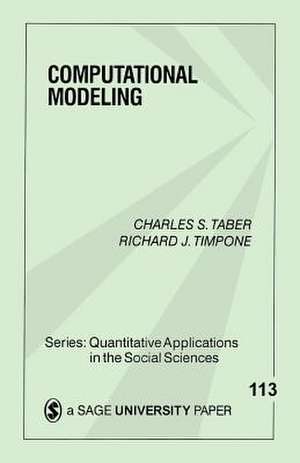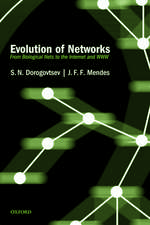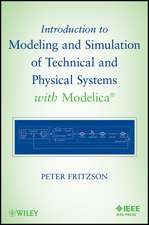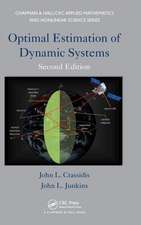Computational Modeling: Quantitative Applications in the Social Sciences, cartea 113
Autor Charles S. Taber, Richard John Timponeen Limba Engleză Paperback – 12 mai 1996
Din seria Quantitative Applications in the Social Sciences
-
 Preț: 323.09 lei
Preț: 323.09 lei -
 Preț: 285.10 lei
Preț: 285.10 lei -
 Preț: 285.33 lei
Preț: 285.33 lei -
 Preț: 274.06 lei
Preț: 274.06 lei -
 Preț: 285.37 lei
Preț: 285.37 lei -
 Preț: 321.52 lei
Preț: 321.52 lei -
 Preț: 330.81 lei
Preț: 330.81 lei -
 Preț: 322.61 lei
Preț: 322.61 lei -
 Preț: 321.79 lei
Preț: 321.79 lei -
 Preț: 323.15 lei
Preț: 323.15 lei -
 Preț: 273.46 lei
Preț: 273.46 lei -
 Preț: 275.42 lei
Preț: 275.42 lei -
 Preț: 277.33 lei
Preț: 277.33 lei -
 Preț: 322.06 lei
Preț: 322.06 lei -
 Preț: 286.18 lei
Preț: 286.18 lei -
 Preț: 285.71 lei
Preț: 285.71 lei -
 Preț: 322.06 lei
Preț: 322.06 lei -
 Preț: 321.52 lei
Preț: 321.52 lei -
 Preț: 322.30 lei
Preț: 322.30 lei -
 Preț: 285.47 lei
Preț: 285.47 lei -
 Preț: 322.61 lei
Preț: 322.61 lei -
 Preț: 321.79 lei
Preț: 321.79 lei -
 Preț: 323.15 lei
Preț: 323.15 lei -
 Preț: 323.36 lei
Preț: 323.36 lei -
 Preț: 322.41 lei
Preț: 322.41 lei -
 Preț: 323.42 lei
Preț: 323.42 lei -
 Preț: 322.61 lei
Preț: 322.61 lei -
 Preț: 284.99 lei
Preț: 284.99 lei -
 Preț: 285.47 lei
Preț: 285.47 lei -
 Preț: 284.99 lei
Preț: 284.99 lei -
 Preț: 289.18 lei
Preț: 289.18 lei -
 Preț: 287.82 lei
Preț: 287.82 lei -
 Preț: 316.12 lei
Preț: 316.12 lei -
 Preț: 288.96 lei
Preț: 288.96 lei -
 Preț: 316.71 lei
Preț: 316.71 lei -
 Preț: 314.98 lei
Preț: 314.98 lei -
 Preț: 317.26 lei
Preț: 317.26 lei -
 Preț: 314.60 lei
Preț: 314.60 lei -
 Preț: 289.95 lei
Preț: 289.95 lei -
 Preț: 289.18 lei
Preț: 289.18 lei -
 Preț: 315.36 lei
Preț: 315.36 lei -
 Preț: 314.98 lei
Preț: 314.98 lei -
 Preț: 314.38 lei
Preț: 314.38 lei -
 Preț: 316.51 lei
Preț: 316.51 lei -
 Preț: 314.76 lei
Preț: 314.76 lei -
 Preț: 288.41 lei
Preț: 288.41 lei -
 Preț: 316.51 lei
Preț: 316.51 lei
Preț: 316.33 lei
Nou
Puncte Express: 474
Preț estimativ în valută:
60.54€ • 62.97$ • 49.98£
60.54€ • 62.97$ • 49.98£
Carte tipărită la comandă
Livrare economică 15-29 aprilie
Preluare comenzi: 021 569.72.76
Specificații
ISBN-13: 9780803972704
ISBN-10: 0803972709
Pagini: 104
Dimensiuni: 140 x 216 x 7 mm
Greutate: 0.13 kg
Ediția:New.
Editura: SAGE Publications
Colecția Sage Publications, Inc
Seria Quantitative Applications in the Social Sciences
Locul publicării:Thousand Oaks, United States
ISBN-10: 0803972709
Pagini: 104
Dimensiuni: 140 x 216 x 7 mm
Greutate: 0.13 kg
Ediția:New.
Editura: SAGE Publications
Colecția Sage Publications, Inc
Seria Quantitative Applications in the Social Sciences
Locul publicării:Thousand Oaks, United States
Cuprins
Introduction
Dynamic Simulation Models
Knowledge-Based Systems
Models of Machine Learning
Evaluating Computational Models
Dynamic Simulation Models
Knowledge-Based Systems
Models of Machine Learning
Evaluating Computational Models
Notă biografică
Professor of the department of political science
Descriere
Computational modelling allows researchers to combine the rich detail of qualitative research with the rigour of quantitative and formal research, as well as to represent complex structures and processes within a theoretical model.
After an introduction to modelling, the authors discuss the role of computational methods in the social sciences. They treat computational methods, including dynamic simulation, knowledge-based models and machine learning, as a single broad class of research tools and develop a framework for incorporating them within established traditions of social science research. They provide a concise description of each method and a variety of social science illustrations, including four detailed examples.











